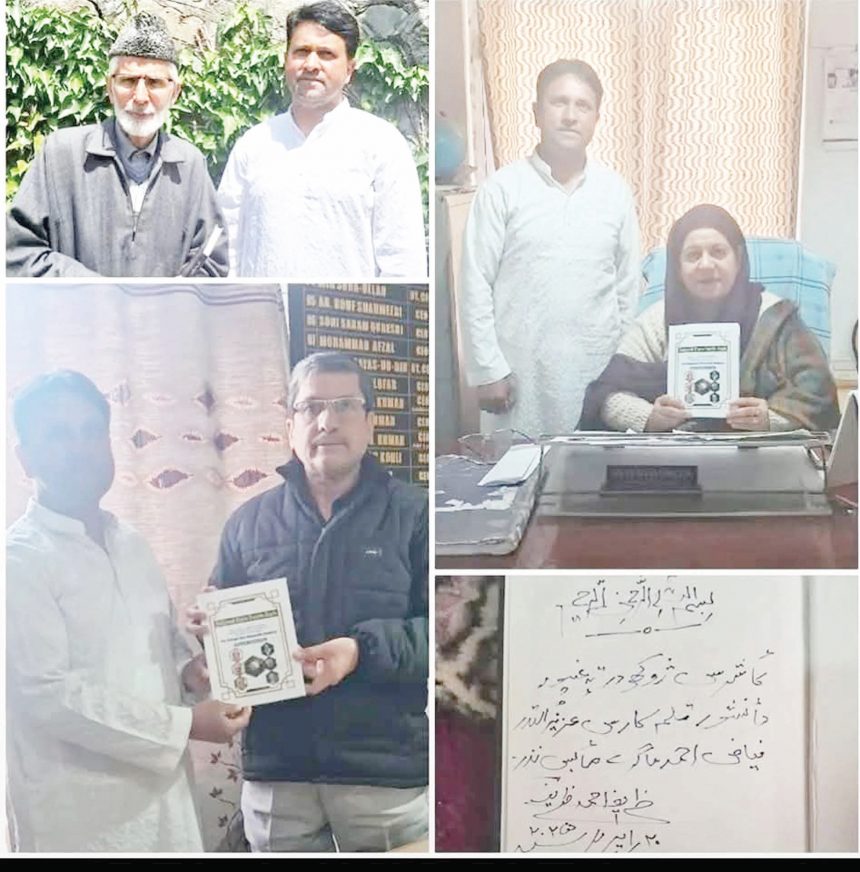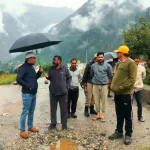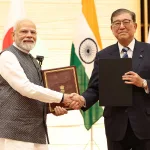In the heart of Kashmir, a region celebrated for its cultural richness and poetic legacy, emerges a fresh literary voice: Magray Fayaz. A young teacher and writer from Kangan in Ganderbal district, Fayaz has etched his name into the valley’s intellectual tapestry with his groundbreaking book, *Eclipsed Stars Dazzle Back*. Presented to esteemed dignitaries, including SDM Kangan Dr. Nazir Ahmad and ZEO Kangan Naseem, on May 5, 2025, this work transcends mere literary achievement, symbolizing a cultural milestone that bridges tradition and modernity. Through its interdisciplinary exploration and fusion of global literary traditions, Fayaz’s book redefines the contours of Kashmiri Sufi literature, offering a resonant dialogue between East and West.
Eclipsed Stars Dazzle Back is a profound odyssey through diverse intellectual realms. Fayaz navigates themes ranging from poetics and politics to aesthetics and spirituality, crafting a narrative that draws equally from Eastern and Western literary canons. By juxtaposing the works of Sufi mystics with Western visionaries, the book creates a vibrant cross-cultural conversation. For instance, Fayaz’s comparative analysis of Persian ghazals and English sonnets illuminates shared human experiences—love, loss, and existential contemplation—while honoring the distinct tonalities of each tradition. This synthesis not only enriches the reader’s understanding but also positions Kashmiri Sufi poetry within a global literary framework.
What distinguishes Fayaz’s work is his innovative analytical approach. Blending science, philosophy, mythology, and literary theory, he dissects the Kashmiri Sufi tradition with scholarly precision and creative flair. One chapter might unravel the scientific metaphors in Rumi’s verses, while another could explore the philosophical underpinnings of Blake’s mysticism. This interdisciplinary method transforms the book into a dynamic “dialogical space,” where ancient Sufi wisdom engages with Enlightenment-era rationalism. Such a framework challenges readers to perceive literature not as isolated texts but as interconnected threads in the tapestry of human thought.
Fayaz’s linguistic dexterity further elevates his work. His prose oscillates seamlessly between formal academic discourse and colloquial warmth, mirroring the fluidity of his thematic explorations. By interlacing Eastern proverbs with Western literary quotations, he constructs a poetic interplay that transcends linguistic boundaries. For example, a Kashmiri folk saying might resonate with a Shakespearean aphorism, revealing universal truths about human nature. This stylistic blend of brevity, wit, and vivid imagery transforms abstract concepts into relatable narratives, inviting readers to find the extraordinary in the mundane.
The book’s structure is as innovative as its content. Rejecting rigid categorization, Fayaz embraces ambiguity and symbolism, crafting a literary “mongrel” that defies genre constraints. Chapters unfold as a series of conversational progressions, where ideas evolve organically through dialectical exchanges between Eastern legends and Western thinkers. This fluid form mirrors the Keatsian ideal of embracing “mysteries and uncertainties,” encouraging readers to dwell in intellectual curiosity rather than seek definitive answers. Such a structure not only reflects the complexity of human consciousness but also celebrates the beauty of unresolved thought.
At its core, Eclipsed Stars Dazzle Back is a manifesto for intellectual freedom. By deconstructing binaries—East versus West, tradition versus modernity—Fayaz liberates Kashmiri Sufi poetry from temporal and spatial confines, bestowing it with timeless relevance. His comparative readings of Persian, Urdu, and English couplets reveal the universality of themes like love and mortality, positioning Sufism as a bridge between disparate cultures. In doing so, the book becomes a testament to Kashmir’s enduring legacy as a crucible of spiritual and artistic exchange.
Magray Fayaz’s Eclipsed Stars Dazzle Back is more than a literary achievement; it is a beacon of cultural revival. By intertwining Kashmir’s Sufi heritage with global intellectual traditions, Fayaz not only honors his roots but also propels them onto the world stage. His work reminds us that literature, at its finest, is a dialogue—one that transcends borders and illuminates the shared depths of human experience. In an era often fragmented by division, Fayaz’s voice emerges as a unifying force, proving that even eclipsed stars can, indeed, dazzle back with renewed brilliance.








